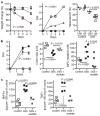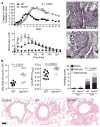Regulation of inflammatory responses by gut microbiota and chemoattractant receptor GPR43
- PMID: 19865172
- PMCID: PMC3256734
- DOI: 10.1038/nature08530
Regulation of inflammatory responses by gut microbiota and chemoattractant receptor GPR43
Abstract
The immune system responds to pathogens by a variety of pattern recognition molecules such as the Toll-like receptors (TLRs), which promote recognition of dangerous foreign pathogens. However, recent evidence indicates that normal intestinal microbiota might also positively influence immune responses, and protect against the development of inflammatory diseases. One of these elements may be short-chain fatty acids (SCFAs), which are produced by fermentation of dietary fibre by intestinal microbiota. A feature of human ulcerative colitis and other colitic diseases is a change in 'healthy' microbiota such as Bifidobacterium and Bacteriodes, and a concurrent reduction in SCFAs. Moreover, increased intake of fermentable dietary fibre, or SCFAs, seems to be clinically beneficial in the treatment of colitis. SCFAs bind the G-protein-coupled receptor 43 (GPR43, also known as FFAR2), and here we show that SCFA-GPR43 interactions profoundly affect inflammatory responses. Stimulation of GPR43 by SCFAs was necessary for the normal resolution of certain inflammatory responses, because GPR43-deficient (Gpr43(-/-)) mice showed exacerbated or unresolving inflammation in models of colitis, arthritis and asthma. This seemed to relate to increased production of inflammatory mediators by Gpr43(-/-) immune cells, and increased immune cell recruitment. Germ-free mice, which are devoid of bacteria and express little or no SCFAs, showed a similar dysregulation of certain inflammatory responses. GPR43 binding of SCFAs potentially provides a molecular link between diet, gastrointestinal bacterial metabolism, and immune and inflammatory responses.
Figures




Comment in
-
Metabolic bridge between microbiota and humans.Nat Rev Immunol. 2016 Apr;16(4):206. doi: 10.1038/nri.2016.18. Nat Rev Immunol. 2016. PMID: 26852927 No abstract available.
References
-
- Mazmanian SK, Round JL, Kasper DL. A microbial symbiosis factor prevents intestinal inflammatory disease. Nature. 2008;453:620–625. - PubMed
-
- Treem WR, Ahsan N, Shoup M, Hyams JS. Fecal short-chain fatty acids in children with inflammatory bowel disease. J Pediatr Gastroenterol Nutr. 1994;18:159–164. - PubMed
-
- Harig JM, Soergel KH, Komorowski RA, Wood CM. Treatment of diversion colitis with short-chain-fatty acid irrigation. N Engl J Med. 1989;320:23–28. - PubMed
Publication types
MeSH terms
Substances
Grants and funding
LinkOut - more resources
Full Text Sources
Other Literature Sources
Medical
Molecular Biology Databases

